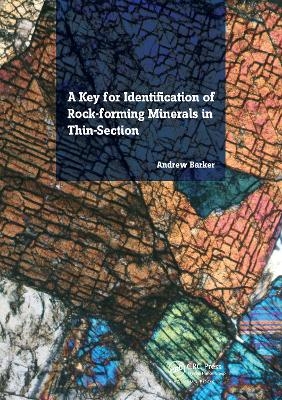
A Key for Identification of Rock-Forming Minerals in Thin Section
CRC Press (Verlag)
978-1-138-43016-7 (ISBN)
Commencing with a brief introduction to mineral systems, and the properties of minerals in plane-polarised and cross-polarised light, the mineral key also includes line drawings, tables of mineral properties and an interference colour chart, to further aid mineral identification. To minimise the chance of misidentification, and enable less experienced petrologists to use the key with confidence, the key has been arranged to prioritise those properties that are most easily recognised.
Designed for simplicity and ease of use, it is primarily aimed at undergraduate and postgraduate students of mineralogy and petrology, but should also provide a valuable source of reference for all practising geologists dealing with rock thin sections and their interpretation.
Dr Andrew Barker has taught mineralogy and petrology at the University of Southampton for more than 30 years. He has research interests in metamorphic petrology, rock microstructures, fluid infiltration and mineralisation. As well as publishing research papers over three decades, he has also authored a textbook on metamorphic textures and microstructures, and has supervised PhD projects in Europe, Africa and Australia. His initial research concentrated on deformation metamorphism inter-relationships during Caledonian and Hercynian orogenesis in Europe, but subsequently moved to look at mineralised Precambrian terrains in Africa. After a period of sabbatical leave to Australia in the late 1990s, his most recent research has concentrated on fluid infiltration processes, reaction mechanisms and mineralisation.
Acknowledgements, 1. Introduction, 2. Key to rock-forming minerals in thin-section, Section 1: 2 (or 3) cleavage traces, Section 2: 1 Cleavage trace, inclined extinction, Section 3: 1 Cleavage trace, straight extinction, colourless, Section 4: 1 Cleavage trace, straight extinction, coloured, Section 5: Imperfect cleavage, parting or arranged fractures, Section 6: 0 Cleavage traces, colourless, Section 7: 0 Cleavage traces, coloured, Section 8: Opaque minerals, Appendices, References, Index
| Erscheinungsdatum | 07.10.2017 |
|---|---|
| Verlagsort | London |
| Sprache | englisch |
| Maße | 174 x 246 mm |
| Gewicht | 453 g |
| Themenwelt | Naturwissenschaften ► Biologie ► Botanik |
| Naturwissenschaften ► Biologie ► Ökologie / Naturschutz | |
| Naturwissenschaften ► Geowissenschaften ► Geologie | |
| Technik ► Umwelttechnik / Biotechnologie | |
| Weitere Fachgebiete ► Land- / Forstwirtschaft / Fischerei | |
| ISBN-10 | 1-138-43016-1 / 1138430161 |
| ISBN-13 | 978-1-138-43016-7 / 9781138430167 |
| Zustand | Neuware |
| Haben Sie eine Frage zum Produkt? |
aus dem Bereich


